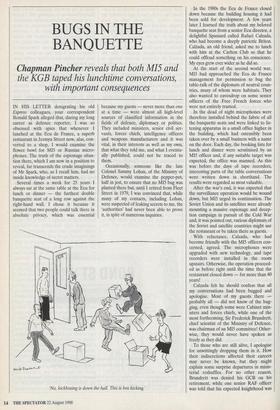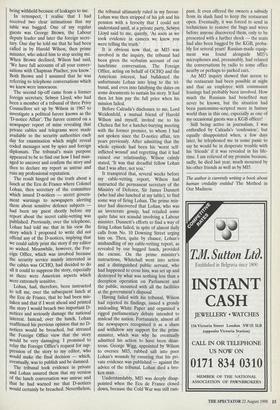BUGS IN THE BANQUETTE
Chapman Pincher reveals that both MIS and
the KGB taped his lunchtime conversations, with important consequences
IN HIS LETTER denigrating his old Express colleagues, your correspondent Ronald Spark alleged that, during my long career as defence reporter, I was so obsessed with spies that whenever I lunched at the Ecu de France, a superb restaurant in Jermyn Street now, alas, con- verted to a shop, I would examine the flower bowl for MI5 or Russian micro- phones. The truth of the espionage situa- tion there, which I am now in a position to reveal, far transcends the crude imaginings of Mr Spark, who, as I recall him, had no inside knowledge of secret matters.
Several times a week for 25 years I always sat at the same table at the Ecu for lunch or dinner — the furthest double banquette seat of a long row against the right-hand wall. I chose it because it seemed that two people could talk there in absolute privacy, which was essential because my guests — never more than one at a time — were almost all high-level sources of classified information in the fields of defence, diplomacy or politics. They included ministers, senior civil ser- vants, forces chiefs, intelligence officers and weapons manufacturers and it was vital, in their interests as well as my own, that what they told me, and what I eventu- ally published, could not be traced to them.
Occasionally, someone like the late Colonel Sammy Lohan, of the Ministry of Defence, would examine the pepper-pot, half in jest, to ensure that no MI5 bug was planted there but, until I retired from Fleet Street in 1979, I was convinced that, while many of my contacts, including Lohan, were suspected of leaking secrets to me, the `authorities' had never been able to prove it, in spite of numerous inquiries.
No, kickboxing is down the hall. This is box kicking.' In the 1980s the Ecu de France closed down because the building housing it had been sold for development. A few years later I learned the truth about my beloved banquette seat from a senior Ecu director, a delightful Spaniard called Rafael Calzada, who had become a deeply patriotic Briton. Calzada, an old friend, asked me to lunch with him at the Carlton Club so that he could offload something on his conscience. My eyes grew ever wider as he did so.
At the start of the second world war, MI5 had approached the Ecu de France management for permission to bug the table-talk of the diplomats of neutral coun- tries, many of whom were habitués. They also wanted to eavesdrop on some senior officers of the Free French forces who were not entirely trusted.
In the dead of night microphones were therefore installed behind the fabric of all the banquette seats and were linked to lis- tening apparatus in a small office higher in the building, which had ostensibly been taken over by a small business with a name on the door. Each day, the booking lists for lunch and dinner were scrutinised by an MI5 officer and, if any suitable target was expected, the office was manned. As this was before the days of tape recorders, interesting parts of the table conversations were written down in shorthand. The results were regarded as most valuable.
After the war's end, it was expected that the surveillance operation would be wound down, but MI5 urged its continuation. The Soviet Union and its satellites were already mounting a massive espionage and decep- tion campaign in pursuit of the Cold War and, it was pointed out, various diplomats of the Soviet and satellite countries might use the restaurant or be taken there as guests.
With reluctance, Calzada, who had become friendly with the MI5 officers con- cerned, agreed. The microphones were upgraded with new technology, and tape recorders were installed in the room upstairs. Otherwise, the operation proceed- ed as before right until the time that the restaurant closed down — for more than 40 years!
Calzada felt he should confess that all my conversations had been bugged and apologise. Most of my guests there probably all — did not know of the bug- ging, even though some were Cabinet min- isters and forces chiefs, while one of the most forthcoming, Sir Frederick Brundrett, chief scientist of the Ministry of Defence, was chairman of an MI5 committee! Other- wise, they would never have spoken as freely as they did.
To those who are still alive, I apologise for unwittingly dropping them in it. How their indiscretions affected their careers may never be known, but they might explain some surprise departures in minis- terial reshuffles. For no other reason, Brundrett was denied his GCB on his retirement, while one senior RAF officer was told that his expected knighthood was being withheld because of leakages to me.
In retrospect, I realise that I had received two clear intimations that my table was bugged. One of my regular guests was George Brown, the Labour deputy leader and later the foreign secre- tary. One day he told me that he had been called in by Harold Wilson, then prime minister, who asked him to stop seeing me. When Brown declined, Wilson had said, 'We have full accounts of all your conver- sations with Chapman Pincher, you know.' Both Brown and I assumed that he was referring to telephone conversations which we knew were innocuous.
The second tip-off came from a former foreign secretary, Selwyn Lloyd, who had been a member of a tribunal of three Privy Counsellors set up by Wilson in 1967 to investigate a political furore known as the `D-notice Affair'. The furore centred on a newspaper report of mine revealing that private cables and telegrams were made available to the security authorities each day for examination which might reveal coded messages sent by spies and foreign diplomats. The tribunal's main purpose appeared to be to fmd out how I had man- aged to uncover and confirm the story and then to declare my report as untrue and ruin my professional reputation.
The result hinged on the truth about a lunch at the Ecu de France where Colonel Lohan, then secretary of the committee which issued D-notices — secret govern- ment warnings to newspapers alerting them about sensitive defence subjects had been my guest shortly before my report about the secret cable-vetting was published. Previously, over the telephone, Lohan had told me that in his view the story which I proposed to write did not offend any of the D-notices, implying that we could safely print the story if my editor so wished. Meanwhile, however, the For- eign Office, which was involved because the security service mainly interested in the cables was GCHQ, had decided to do all it could to suppress the story, especially as there were American aspects which were extremely sensitive. Lohan, had, therefore, been instructed to tell me, over the subsequent lunch at the Ecu de France, that he had been mis- taken and that if I went ahead and printed the story I would breach two important D- notices and seriously damage the national interest. Instead, over the lunch, Lohan reaffirmed his previous opinion that no D- notices would be breached, but stressed the Foreign Office view that the story would be very damaging. I promised to relay the Foreign Office's request for sup- pression of the story to my editor, who would make the final decision — which, eventually, was to publish and be damned. The tribunal took evidence in private and Lohan assured them that my version of the lunch conversation was untrue and that he had warned me that D-notices would certainly be breached. Nevertheless, the tribunal ultimately ruled in my favour. Lohan was then stripped of his job and his pension with a ferocity that I could not understand until, at a private party, Selwyn Lloyd said to me, quietly, 'As soon as we took evidence in camera we knew you were telling the truth.'
It is obvious now that, as MI5 was involved in the inquiry, the tribunal had been given the verbatim account of our lunchtime conversation. The Foreign Office, acting on behalf of GCHQ and the American interest, had bulldozed the unfortunate Lohan into lying to the tri- bunal, and even into falsifying the dates on some documents to sustain his story. It had then let him pay the full price when his mission failed.
Before Calzada's disclosure to me, Lord Weidenfeld, a mutual friend of Harold Wilson and myself, invited me to his Chelsea flat for a hatchet-burying meeting with the former premier, to whom I had not spoken since the D-notice affair, ten years previously. After admitting that the whole episode had been his 'worst self- inflicted wound' and regretting that it had ruined our relationship, Wilson calmly stated, 'It was that dreadful fellow Lohan that I was after, not you.'
It transpired that, several weeks before my cable-vetting report, Wilson had instructed the permanent secretary of the Ministry of Defence, Sir James Dunnett (who had also lunched at my table), to find some way of firing Lohan. The prime min- ister had discovered that Lohan, who was an inveterate gossip, had retailed some quite false sex scandal involving a Labour minister. Dunnett's efforts to find a way of firing Lohan failed, in spite of almost daily calls from No. 10 Downing Street urging him on. Then, quite by chance, Lohan's mishandling of my cable-vetting report, as revealed by our bugged lunch, provided the excuse. On the prime minister's instructions, Whitehall went into action and a distinguished public servant, who had happened to cross him, was set up and destroyed by what was nothing less than a deception operation on Parliament and the public, mounted with all the facilities at the government's disposal.
Having failed with his tribunal, Wilson had rejected its findings, issued a grossly misleading White Paper and organised a rigged parliamentary debate intended to mislead the nation. Fortunately, almost all the newspapers recognised it as a sham and withdrew any support for the prime minister, which was why he eventually admitted his action to have been disas- trous. George Wigg, appointed by Wilson to oversee MI5, rubbed salt into poor Lohan's wounds by ensuring that his pri- vate evidence was published — against the advice of the tribunal. Lohan died a bro- ken man.
Understandably, MI5 was deeply disap- pointed when the Ecu de France closed down, because the Cold War was still ram- pant. It even offered the owners a subsidy from its slush fund to keep the restaurant open. Eventually, it was forced to send in technicians to remove the bugs and wires before anyone discovered them, only to be presented with a further shock — the seats had also been bugged by the KGB, proba- bly for several years! Russian-made equip- ment was found alongside MI5's microphones and, presumably, had relayed the conversations by radio to some office nearby or perhaps to parked cars.
An MI5 inquiry showed that access to the restaurant had been possible at night and that an employee with communist leanings had probably been involved. How much the Russians had benefited may never be known, but the situation had been pantomime-scripted more in fantasy world than in this one, especially as one of my occasional guests was a KGB officer!
Still being active in journalism, I was enthralled by Calzada's 'confession', but equally disappointed when, a few days later, he telephoned me in some panic to say he would be in desperate trouble with his 'friends' if it was revealed in his life- time. I am relieved of my promise because, sadly, he died last year, much mourned by his other friends as well as by MI5.
The author is currently writing a book about human credulity entitled The Method in Our Madness.

























































 Previous page
Previous page